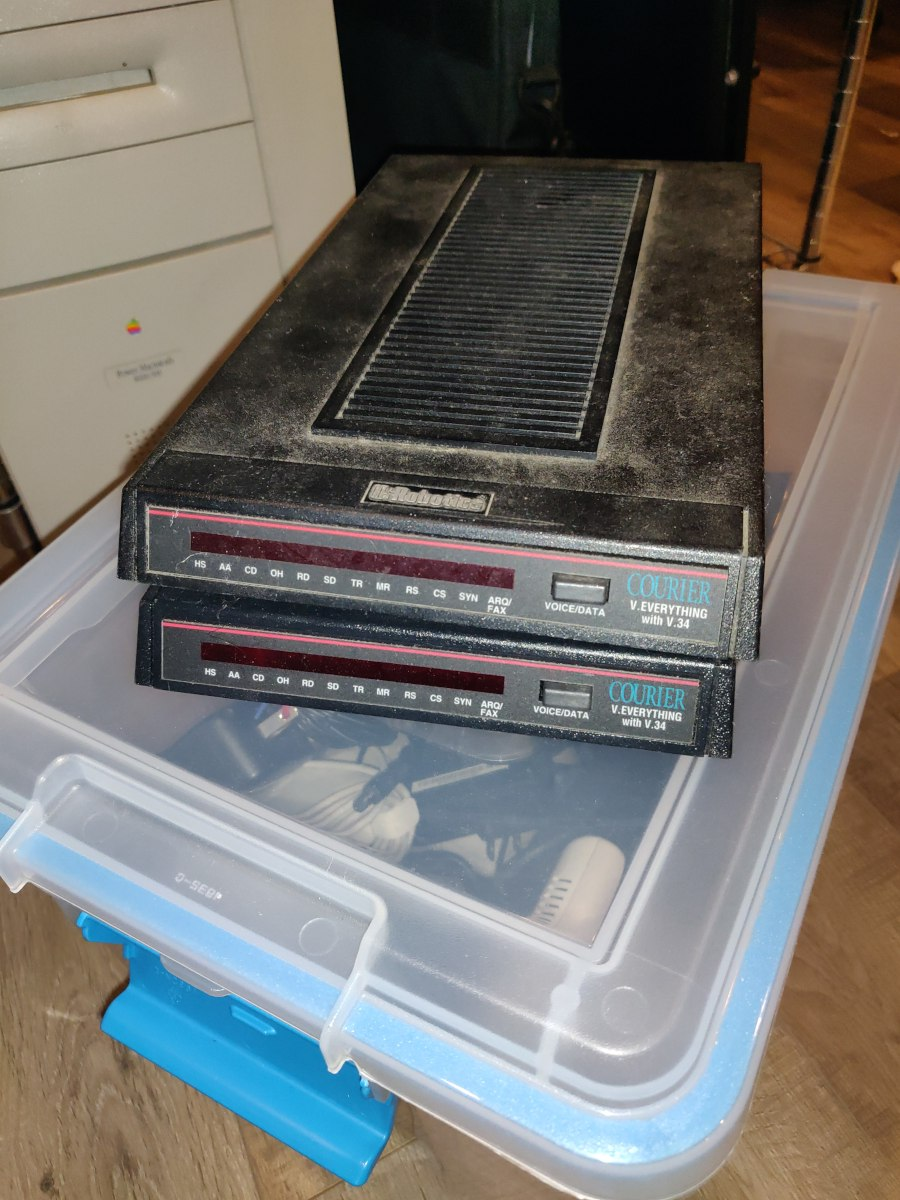Hayes 1200. Anyone know why these things were built to be bombproof? Always kinda wondered about that…
300 baud home made.
300 baud C64
First was a Novation CAT 110/300 baud with acoustic coupler. Later I got a Practical Peripherals 1200, then a Zoom Telephonics 2400/9600. Then I bought a US Robotics Courier HST, it cost a ridiculous amount at the time. A few years later was working and I mailed it and an actual check to USR and they swapped it for a Courier vEverything (with the 20Mhz DSP). I still have that modem and a newer vEverything I salvaged.

+++ATH0 OK *NO CARRIER*C64 VICModem. 300 baud, manual dial. :)
That was my first one as well.
My first PC modem was the US Robotics Sportster 14400 FAX Modem. A cool feature was that you could flip a couple of bits and it would do 19200. USR reportedly grumbled about that breaking the warranty and using it against its design limits, but it worked great.
300baud from work. Fun times logging in with it. Eventually moved to 2400baud.
Supra 2400, to LineLink 144E, to Practical Peripherals 28.8 (all of these external). Being a kid I was limited to upgrading when birthday and holiday money was saved up.
To one way broadband with this weird box containing a 56kbps modem you plugged a phone cord into for the uplink and a 1.5mbps downlink over cable coax. Bi directional broadband wasnt available yet.
First one that I had myself was a 300 baud acoustic modem. It came in a wooden box that was about the size of a shoe box but more square.
My brother had an acoustic coupled 300 baud modem for his C64, but that stuff was off limits to me. My first was a 2400 baud on ISA card, I bought for the family IBM XT Clone when I was maybe 13, I came up with the money with a hustle. I bought an old lionel train set at a garage sale with $20, sold it to a train shop for $100 (they probably screwed me over). It was my first pc component install, I remember setting the dip switches for the IRQ channel.
I don’t know the model, but my first modem was 2400 baud
Downloading anything took forever but it was still a magical experience to me!
I couldn’t figure out how to silence the modem sounds either (if it was even possible) so every time I wanted to use the computer when someone in the house was sleeping I had to pray the connection sounds wouldn’t wake anyone up!
ATL0orATM0should have silenced it. Unfortunately I had to use the Internet to look that up. :)saving this for when time travel is invented so I can go back and tell my younger self, my mother would appreciate it!
The TelePort Gold II came in at a speedy 14.4 Kbps. It came with my Macintosh Performa.
Apple Geoport Telecom Adapter: 9600 baud.
I’m reading up on it now to confirm actual details match my memory, and seeing that it was software upgradable up to 33.6 kbps. I don’t think we ever actually did that, seeing as how our Macintosh Centris 660AV was never upgraded past the System 7.1 it came with.
14.4k that was more consistent as 9600. Packard Bell ISA modem.
Later I went 33.6 and went off to college with a 56k external modem that was supported by FreeBSD.
I think I used to be able to tell the different speeds by the handshake sound.
My first modem was a Dataphone s21 (German Akustikkoppler) for the Commodore C64. It gave me breath-taking 300 baud on the data highway (aka boards).
It was a Radio Shack 300 baud modem. A little googling seems to indicate is would likely have been a Tandy DCM-3 “Direct Connect” (as opposed to acoustic coupler) modem.
It was in-line between the wall and a phone so you would pick up the phone, dial the number, head the modem tone, press a red button on the top of the modem and hang up the phone.








